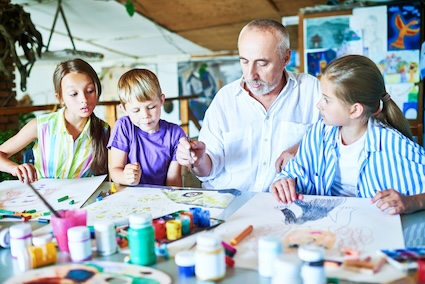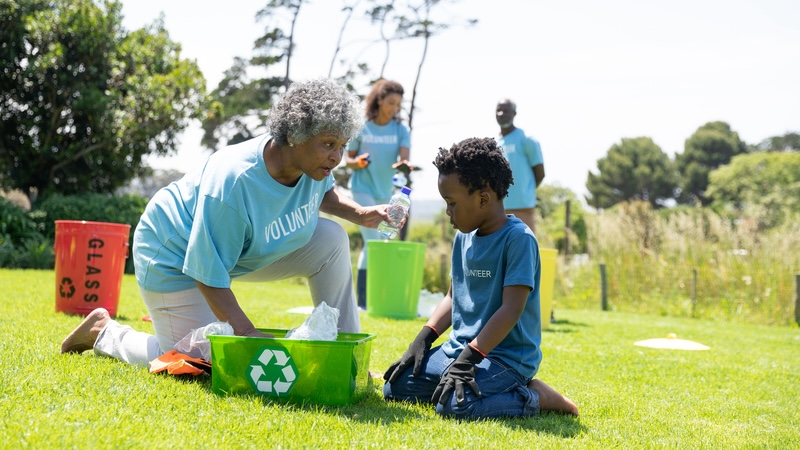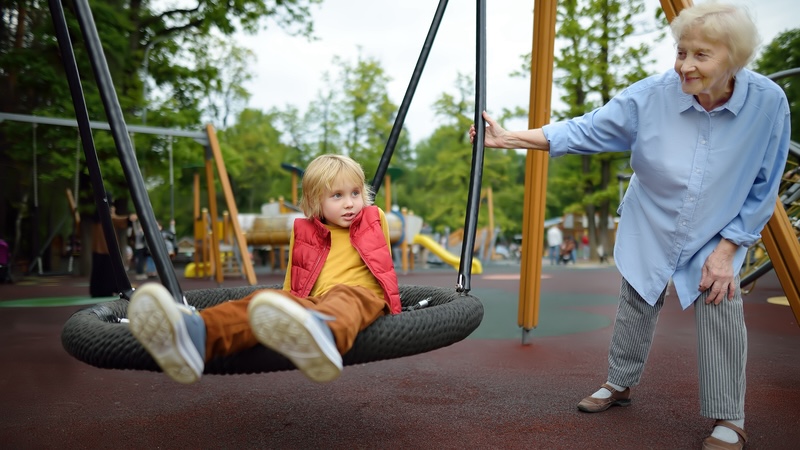Spending time with people of all ages benefits everyone, young and old alike. Seniors Guide writer Terri L. Jones shares the benefits of intergenerational programs and ways to engage.
Families around the world live in multigenerational households with grandparents sharing space and day-to-day lives with their adult children and grandkids, along with other extended family members. Not too long ago, most American families lived this way as well. However, the pursuit of economic opportunities, better transportation, and the growth of suburbia in the mid-20th century gave birth to the nuclear family, and young parents and their offspring began building lives apart from their elders.
Living in separate households is just the tip of the generation gap we experience these days. According to Sheri Y. Steinig, director of strategic initiatives and communications at the nonprofit Generations United, “Children, adults, and older adults now spend most of their time in age-specific spaces, which can increase rivalry, ageism, and missed opportunities to learn from and serve one another and their community.”
“Bringing the generations together actually does place older people in a position where they can see the hope, enthusiasm, and wonder of children, and the children can also benefit from the wisdom older people can offer,” explains Lyn Phillipson, associate professor at University of Wollongong in Australia, whose research focuses on the benefits of intergenerational relationships.
What are some benefits of intergenerational programs for young and old?
Whether you’re babysitting your own grandkids or mentoring, reading to young hospital patients or teaching in a Sunday school class, here are ways that intergenerational engagement can benefit both sides of the young person-older person relationship.
For seniors:
Increases purpose and socialization
 “Older adults … welcome meaningful, productive activity and engagement. They seek – and need – purpose in their lives,” cited a Stanford report about the resources that seniors can offer young people. When you witness how eager kids are to spend time with you and the impact you’re having through this interaction, you feel needed and valued, which pays dividends in terms of your self-esteem.
“Older adults … welcome meaningful, productive activity and engagement. They seek – and need – purpose in their lives,” cited a Stanford report about the resources that seniors can offer young people. When you witness how eager kids are to spend time with you and the impact you’re having through this interaction, you feel needed and valued, which pays dividends in terms of your self-esteem.
This engagement can also combat older adults’ social isolation and corresponding loneliness and depression. At one senior center, the director reported that visits from a group of kids worked like antidepressants to enliven some of the more sullen older folks.
Improves health
Hanging out with children pretty much guarantees that you won’t be spending a lot of time on the couch! Whether you’re coaching a sports team or just babysitting the neighbor’s kids, you may be running, hopping, tossing a ball, throwing a frisbee, or at the very least, chasing after those bundles of energy! And that level of activity goes a long in keeping you healthy. In fact, research found that seniors who regularly volunteer with children burn more calories and fall less frequently than others in their age group.
Activities such as helping kids with their homework or working puzzles can stimulate you mentally and improve memory, critical thinking, and overall brain health.
For youth:
Strengthens emotional and social skills
 According to Psychology Today, connecting with seniors can help young adults develop important social and emotional skills, including communication, empathy, collaboration, and problem-solving. “By fostering meaningful interactions across age groups, these programs promote understanding, respect, acceptance, and cooperation,” says Sheri Steinig from Generations United. “Participants gain insight into different life experiences and perspectives, which cultivates empathy and reduces generational stereotypes.”
According to Psychology Today, connecting with seniors can help young adults develop important social and emotional skills, including communication, empathy, collaboration, and problem-solving. “By fostering meaningful interactions across age groups, these programs promote understanding, respect, acceptance, and cooperation,” says Sheri Steinig from Generations United. “Participants gain insight into different life experiences and perspectives, which cultivates empathy and reduces generational stereotypes.”
Fosters success
In a Big Brothers Big Sisters study, children who participated for 18 months in the program were 46% less likely to begin using illegal drugs and 52% less likely to skip school. They were also 20% more likely to enroll in college. The nonprofit DOROT, which connects youth volunteers with older adults, reported that 82% of the teens in their intergenerational programs said they were better at taking initiative and 89% believed the opportunities strengthened their leadership skills.
For both:
Encourages knowledge sharing
These intergenerational relationships provide plenty of opportunities for learning for young and old alike. Children can teach you about the latest music and fashion styles, how to play video games, and the meaning of certain emojis. In return, you can teach kids about history through your own experiences, pass down knowledge about the profession you were in or the hobbies you enjoy, or simply show them how to fold a paper airplane!
Creates lasting bonds
Through the activities you enjoy together, you learn about one another and develop trust. The bonds you form often last well beyond the end of the baseball season or the mentoring program. Take one senior living community in Florida, for example, which has a daycare and preschool onsite. Every week, the kids who attend this school join senior living residents for art projects, drum circles, balloon volleyball, and more. They refer to each other as “grandfriends.”
“You can see emotional impact, joy, sense of purpose being renewed [for the seniors],” explains the community’s recreation specialist and life enrichment director, adding that in return, the children receive special one-on-one attention from the residents, which they look forward to, especially if their own grandparents aren’t around.
Strengthens communities
The benefits of intergenerational programs far exceeds just the impact on individuals. Consistent engagement between the generations fosters understanding and respect across the age groups, which ultimately leads to more empathetic and inclusive communities. And when you feel accepted and valued, you also feel more invested in your community. That’s where the benefits of intergenerational engagement come full circle, making you more willing to give of your time and energy to your neighbors.
Related: Benefits of Moving Closer to Family
Explore cross-generational programs
To find these benefits in an intergenerational program that’s right for you:
- Inquire at your local community centers, hospitals, libraries, schools, churches, or senior centers.
- Search Generations United’s database
- Look for volunteer opportunities on Idealist.org.
- Learn of other ideas in this Seniors Guide article: “Volunteer Grandparents” Reaching Children





